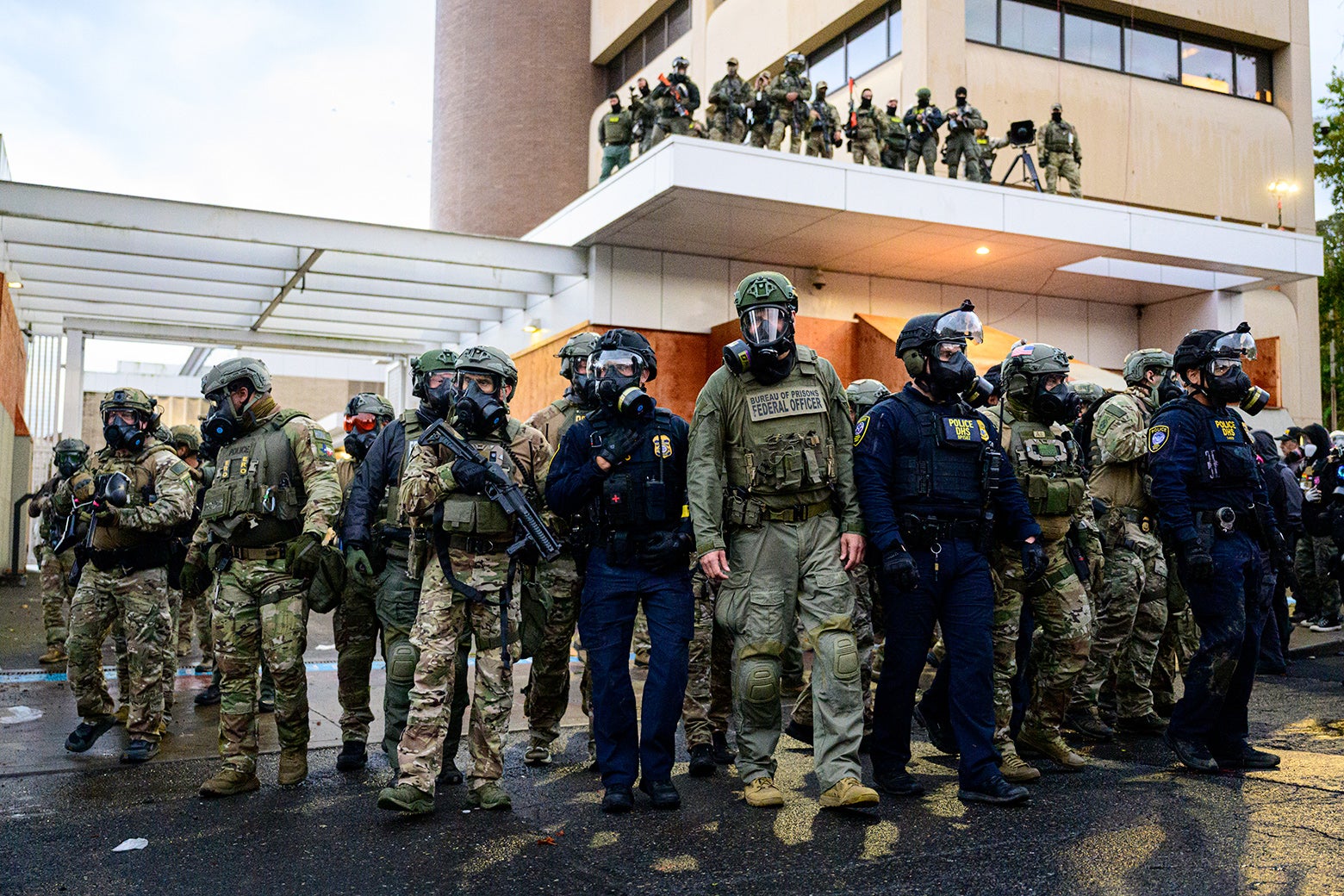Politics
Judge Blocks Trump’s National Guard Deployment in Portland

U.S. District Judge Karin Immergut issued a permanent injunction on March 15, 2023, preventing former President Donald Trump from deploying the National Guard in Portland, Oregon. The ruling concluded that the federal government had no legal authority to intervene, as local law enforcement was effectively managing protests against Immigration and Customs Enforcement (ICE).
The judge, nominated by Trump himself, emphasized the importance of credibility in her decision. She found the state’s assertion that its police could handle the situation more believable than the Justice Department’s claim of a violent emergency. Immergut’s ruling dismissed many of the federal government’s assertions as exaggerated or false.
In a recent episode of Slate Plus, legal commentators Dahlia Lithwick and Mark Joseph Stern analyzed the ruling. They noted that Immergut’s 106-page decision meticulously examined the evidence presented during a three-day bench trial. Her findings repeatedly highlighted the contrast between the testimonies offered by Trump administration officials and those from representatives of Oregon.
Stern pointed out that the Justice Department had previously been caught lying in this matter. Immergut’s latest ruling unveiled more instances of falsehoods, particularly concerning the necessity of federal law enforcement assistance. She scrutinized witness testimonies and evidence, ultimately determining that there was no lawful basis for invoking the National Guard.
Among the notable testimonies was that of Cammilla Wamsley, the ICE field office director in Seattle and Portland. Wamsley claimed that protesters had caused extensive damage to the ICE facility, reporting broken windows and doors throughout the building. However, Immergut found “no credible evidence” to support these claims, noting that no photos or documentation of the alleged damage existed.
In her ruling, Immergut criticized Wamsley’s overall reliability regarding the protests. She stated that the claims of protesters breaching security and invading the lobby of the ICE facility were “inconsistent” with other evidence presented during the trial.
Another point of contention involved allegations of violence against federal officers. The deputy regional director of the Federal Protective Service testified that officers were struck by fireworks and rocks. Yet, Immergut found no evidence to substantiate these claims, as the alleged victims did not appear in court to testify. Additionally, the Portland police investigated ICE’s assertion that they had to barricade themselves due to violence and found it to be untrue.
Immergut’s ruling underscores a significant conflict between state and federal law enforcement. While ICE portrayed the protesters as violent and out of control, the Portland police maintained that public safety was being upheld. Despite the challenges faced by the Portland police, their records indicated that ICE’s claims were often contradicted by video evidence and other documented activities.
The trial also revealed discrepancies in federal officers’ assertions regarding local police assistance. Two federal officers accused the Portland police of refusing to help them when needed, a claim that Immergut found unsubstantiated. The trial record showed that the local police had routinely assisted federal officers in potentially dangerous situations.
Lithwick and Stern highlighted the troubling trend of federal officials providing misleading testimonies under oath, stating that such occurrences have become alarmingly common. They referenced another case involving ICE, where immigrants claimed civil rights violations at a holding facility in Chicago. The government recently admitted that crucial surveillance video evidence from inside the facility had been “irretrievably destroyed.”
This situation raises concerns about accountability and the integrity of evidence in legal proceedings. As Immergut’s ruling demonstrates, establishing a clear record is essential for determining the veracity of claims made by various parties. Without stringent measures to address dishonesty in court, the prevalence of misleading testimonies may continue to undermine the legal system.
Judge Immergut’s decision not only reinforces the importance of credible evidence in judicial proceedings but also highlights the ongoing tensions between federal and local law enforcement in addressing civil unrest. The implications of this ruling may extend beyond Portland, as it reflects broader issues of accountability and truthfulness within federal agencies.
-

 Top Stories3 weeks ago
Top Stories3 weeks agoMarc Buoniconti’s Legacy: 40 Years Later, Lives Transformed
-

 Business2 weeks ago
Business2 weeks agoForeign Inflows into Japan Stocks Surge to ¥1.34 Trillion
-

 Health3 weeks ago
Health3 weeks agoInnovative Surgery Restores Confidence for Breast Cancer Patients
-

 Sports1 month ago
Sports1 month agoSteve Kerr Supports Jonathan Kuminga After Ejection in Preseason Game
-

 Top Stories3 weeks ago
Top Stories3 weeks agoBOYNEXTDOOR’s Jaehyun Faces Backlash Amid BTS-TWICE Controversy
-

 Science2 weeks ago
Science2 weeks agoUniversity of Hawaiʻi Joins $25.6M AI Project to Monitor Disasters
-

 Science1 month ago
Science1 month agoChicago’s Viral ‘Rat Hole’ Likely Created by Squirrel, Study Reveals
-

 Entertainment1 month ago
Entertainment1 month agoZoe Saldana Advocates for James Cameron’s Avatar Documentary
-

 Lifestyle1 month ago
Lifestyle1 month agoKelsea Ballerini Launches ‘Burn the Baggage’ Candle with Ranger Station
-

 Top Stories3 weeks ago
Top Stories3 weeks agoCarson Wentz Out for Season After Shoulder Surgery: Urgent Update
-

 Politics1 month ago
Politics1 month agoDallin H. Oaks Assumes Leadership of Latter-day Saints Church
-

 Lifestyle1 month ago
Lifestyle1 month agoDua Lipa Celebrates Passing GCSE Spanish During World Tour









